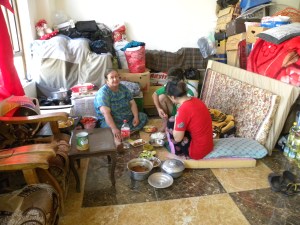How many journalists do you know who would travel to Kurdistan, the target of U.S. bombing, to bring the world the inside story of Christian persecution in Iraq? As this article was being written, Italian Journalist Elisabetta Valgiusti was there filming an EWTN original documentary. The program is scheduled to run on EWTN in late 2014 or early 2015.
 The intrepid filmmaker is no stranger to the Middle East or to Christian persecution, having filmed in Iraq, Egypt, Nineveh, Syria, Turkey, Armenia and many other countries, including Russia and India. She has documented Christian persecution in numerous documentaries for EWTN including “Christian Witness in the Middle East,” “Nineveh’s Christians,” and “Iraq’s Christian Refugees.”
The intrepid filmmaker is no stranger to the Middle East or to Christian persecution, having filmed in Iraq, Egypt, Nineveh, Syria, Turkey, Armenia and many other countries, including Russia and India. She has documented Christian persecution in numerous documentaries for EWTN including “Christian Witness in the Middle East,” “Nineveh’s Christians,” and “Iraq’s Christian Refugees.”
But in an interview conducted with her by phone from Kurdistan, you can hear that this assignment is different. Her anguish is palpable. She sounds exhausted, dismayed and more than a little overwhelmed by the human suffering she is witnessing in Kurdistan. Although she traipses through the countryside with a camera in hand, her exhaustion is clearly more than physical. Valgiusti is emotionally drained because everywhere she looks she sees nothing but traumatized refugees.
She estimates there are about 150,000 Christian refugees in Kurdistan; they are mainly Syriac Catholics and Syriac Orthodox, Chaldean Catholics and Assyrian Christians. All are Iraqis who were forced to flee their homes in the middle of the night with absolutely nothing but the clothes on their backs. These families have no money, no food, and no shelter. Worst of all, they don’t speak Kurdish, so they cannot hope to go to school or secure a job. Valgiusti calls the situation “a disaster.”
 People who are terrified and who don’t know where to turn sometimes behave badly. But Valgiusti says that is not the case with Christians in Kurdistan. “They are very courageous. I would be hysterical, but they behave very decently. These Nineveh Christians were used to living like Westerners. Their society was a balanced one. There were no poor people. Now, they are all in misery.”
People who are terrified and who don’t know where to turn sometimes behave badly. But Valgiusti says that is not the case with Christians in Kurdistan. “They are very courageous. I would be hysterical, but they behave very decently. These Nineveh Christians were used to living like Westerners. Their society was a balanced one. There were no poor people. Now, they are all in misery.”
From the outside, it seems surprising that Kurdistan would allow so many people to cross their border. However, it turns out that these refugees are mostly from Nineveh. The Kurdish army has protected this area for about a decade, Valgiusti says. However, when the normally fierce Kurdish army suffered a humiliating defeat in August by the Muslim terrorist group known as ISIS, Christians – who had been warned they had to convert to Islam or die — had no choice but to flee for their lives.
Valgiusti was especially upset after meeting some of the families she had befriended while filming other EWTN documentaries on Iraq, such as 2006’s “Nineveh’s Christians.” The parents of one of these families were a couple with good jobs, a nice home, and five children aged 15 to 21. She found these friends of hers packed into a schoolroom with 40 other people.
The story has become personal.
 “Can you imagine?” she asks. “They had jobs and lived in nice homes like you and me.” She tried to have a somewhat normal conversation with the family, but discovered that she was shaking. “They said to me, “Can you help us get out?’ She pauses, and then says in an anguished voice, “I don’t know how. How do I help them?”
“Can you imagine?” she asks. “They had jobs and lived in nice homes like you and me.” She tried to have a somewhat normal conversation with the family, but discovered that she was shaking. “They said to me, “Can you help us get out?’ She pauses, and then says in an anguished voice, “I don’t know how. How do I help them?”
Many would say Valgiusti is helping the refugees by getting out the word about their plight. But clearly, she sees they need much more.
So who is helping these Christians? How are they surviving?
“The local priests are doing everything,” Valgiusti said. “They give them shelter — they find buildings or centers to get them out of tents – regular daily meals and clothing.”
Few people can remain impartial in the face of such suffering and Valgiusti makes no apologies for her outrage on behalf of the refugees. She remembers Nineveh as a very special place. For over 2,000 years, Christians have populated the city. Now, it is empty.
“I have seen very bad things,” says Valgiusti, who sounds as if she is struggling to hold back her tears. “I think of the look on the faces of the refugees. They are physically beautiful people. Their attitudes are beautiful. They are so special. They want to get out. It is very unsafe, very uncertain. Everything is a tragedy – [and] only the Church is helping.”
Note: Help persecuted Christians! Consider donating to Catholic Relief Services at http://emergencies.crs.org/human-kindness-at-the-forefront-of-iraq-humanitarian-crisis/, and/or Aid to the Church in Need at http://www.aidtochurch.org/. See trailers of Valgiusti’s work at https://www.youtube.com/user/Savethemonasteries, and on Facebook at https://www.facebook.com/Savethemonasteries.
And please check EWTN’s website, www.ewtn.com, in late 2014 or early 2015, for dates and times of Valgiusti’s documentary on these persecuted Christians from Iraq.
